Ezra 6 meaning explained in AI Summary
Chapter 6 of Ezra recounts the discovery of Cyrus's decree and the subsequent resumption and completion of the Jerusalem temple's reconstruction.
1. The Decree Found: Darius, prompted by the Jews' progress on the temple, orders a search for Cyrus's original decree authorizing the rebuilding. The document is found in the royal archives at Ecbatana.
2. Darius's Confirmation: Darius not only reaffirms Cyrus's decree but also orders the local authorities to support the temple's construction. He allocates resources from the royal treasury to cover the expenses and commands them to provide the Jewish priests with animals and supplies for regular sacrifices.
3. Temple Completion: With the Persian government's backing, the Jews complete the temple construction. The work is finished within the specified timeframe, marking a significant victory for the returning exiles.
4. Celebration and Dedication: The temple is inaugurated with great joy and celebration. The people celebrate Passover, offer sacrifices according to the Law of Moses, and install priests and Levites in their respective roles.
Key Themes:
- God's Sovereignty: Despite opposition, God orchestrates events, using even a pagan king like Darius to fulfill His purposes and ensure the temple's rebuilding.
- Fulfillment of Prophecy: The temple's reconstruction aligns with the prophetic word, demonstrating God's faithfulness to His promises.
- Restoration and Renewal: The completion of the temple symbolizes the restoration of Jewish religious life and identity in Jerusalem.
- Importance of Obedience: The Jews' obedience to God's commands and their perseverance despite obstacles lead to the successful completion of the temple.
Chapter 6 marks a turning point in the book of Ezra, shifting from the initial challenges and opposition to a time of celebration and renewed hope for the future.
Ezra 6 bible study ai commentary
Ezra 6 describes the triumphant conclusion to the conflict over the rebuilding of the temple. Through the sovereign intervention of God, a search of the Persian royal archives validates the Jews' claims, leading King Darius not only to reaffirm Cyrus's original decree but to expand upon it, providing royal funding and protection for the project. This divine overruling of gentile power silences the opposition, enabling the Jews to complete the second temple. The chapter culminates in the joyous dedication of the temple and the celebration of Passover, marking a significant moment of restored worship, covenant renewal, and national identity for the returned exiles.
Ezra 6 Context
This chapter is situated in the post-exilic period under the Achaemenid (Persian) Empire, around 520-515 B.C. The narrative is a direct continuation of the conflict in Ezra 5, where local governor Tattenai challenged the legality of the temple construction. The section from Ezra 4:8 to 6:18 is written in Aramaic, the official administrative language of the Persian Empire, which underscores the official, legal nature of the documents and correspondence central to this part of the story. The events demonstrate the Persian policy of generally tolerating and even supporting the local religions of their vassal states to maintain stability and divine favor for the empire.
Ezra 6:1-5
Then Darius the king made a decree, and search was made in the house of the rolls, where the treasures were laid up in Babylon. And there was found at Achmetha, in the palace that is in the province of the Medes, a roll, and therein was a record thus written: In the first year of Cyrus the king the same Cyrus the king made a decree concerning the house of God at Jerusalem, Let the house be builded, the place where they offered sacrifices, and let the foundations thereof be strongly laid; the height thereof threescore cubits, and the breadth thereof threescore cubits; with three rows of great stones, and a row of new timber: and let the expenses be given out of the king's house: and also let the golden and silver vessels of the house of God, which Nebuchadnezzar took forth out of the temple which is at Jerusalem, and brought unto Babylon, be restored, and brought again unto the temple which is at Jerusalem, every one to his place, and place them in the house of God.
In-depth-analysis
- Aramaic Text: This section's Aramaic lends it the feel of an official court record.
- The Search: Darius initiates a bureaucratic search, showing his commitment to justice and established law. The search begins in Babylon, the previous administrative center, but the key document is found elsewhere.
- Achmetha (Ecbatana): The scroll (megillah) was found not in Babylon but in Ecbatana, the summer capital of the Medes and Persians. This detail lends historical credibility to the account, as official documents were often moved with the royal court.
- The Document: The document is described as a dikrona (a "memorandum" or "record"), an internal administrative note rather than a public proclamation. This explains why it wasn't readily available and had to be searched for in the archives (bet sifraya - "house of the books/scrolls").
- Cyrus's Decree: The memorandum confirms every detail the Jewish elders claimed: authorization to build, specific (and generous) dimensions (60x60 cubits, larger than Solomon's original temple), funding from the royal treasury, and the command to return the sacred vessels taken by Nebuchadnezzar. The meticulous record-keeping of the Persian empire becomes the instrument of God's will.
Bible references
- Isa 44:28: '...who says of Cyrus, ‘He is my shepherd, and he shall fulfill all my purpose’; saying of Jerusalem, ‘She shall be built,’ and of the temple, ‘Your foundation shall be laid.’' (Prophetic fulfillment)
- 2 Chr 36:22-23: 'Now in the first year of Cyrus... the LORD stirred up the spirit of Cyrus king of Persia, so that he made a proclamation...' (The original decree)
- Dan 9:25: 'Know therefore and understand that from the going out of the word to restore and build Jerusalem...' (The power of a royal decree in God's plan)
- Ezra 1:7-8: 'Cyrus the king also brought out the vessels of the house of the LORD that Nebuchadnezzar had carried away from Jerusalem...' (Confirmation of the vessels being returned)
Cross references
Dan 5:2 (Nebuchadnezzar's sacrilege with the vessels); Dan 6:1-2 (Persian organization); Esth 2:23 (events recorded in chronicles); Hag 2:3 (comparing second temple with first).
Polemics
The preservation and discovery of this obscure memorandum stands in stark contrast to the fallibility of human memory and the ephemeral nature of oral commands. It showcases a God who works through official, written, human records to ensure His eternal, unwritten purpose comes to pass. The narrative asserts that the God of Israel is not a minor tribal deity but the Lord of history, whose plans are embedded even within the bureaucratic archives of the world's greatest empire.
Ezra 6:6-12
"Now therefore, Tattenai, governor of the province Beyond the River, Shethar-bozenai, and your associates... keep away; let the work on this house of God alone. Let the governor of the Jews and the elders of the Jews build this house of God on its site. Moreover, I make a decree that you shall do for these elders of the Jews for the building of this house of God: the cost is to be paid to these men in full and without delay from the royal revenue, the tribute of the province Beyond the River... Whatever is needed—young bulls, rams, or sheep for burnt offerings to the God of heaven, wheat, salt, wine, or oil, as the priests at Jerusalem require—let that be given to them day by day without fail, that they may offer pleasing sacrifices to the God of heaven and pray for the life of the king and his sons. Also I make a decree that if anyone alters this edict, a beam shall be pulled out of his house, and he shall be impaled on it, and his house shall be made a dunghill. May the God who has caused his name to dwell there overthrow any king or people who shall put out a hand to alter this or to destroy this house of God that is in Jerusalem. I Darius make a decree; let it be done with all diligence."
In-depth-analysis
- Reversal of Opposition: Darius commands Tattenai and the other officials not just to cease their opposition but to actively support the project. The opposition is turned into an instrument of provision.
- Royal Funding: The provision is extravagant: "in full and without delay" from the regional taxes. The project’s antagonists are now its designated financiers. This removes the economic burden from the Jewish community and ensures the work's swift completion.
- Support for Worship: The king commands provision for the daily sacrifices ("day by day without fail"), demonstrating an understanding of the requirements of Jewish worship. He uses the title "God of heaven," a respectful term common in Persian correspondence for supreme, non-Persian deities like Yahweh.
- Request for Prayer: The motivation is clear: "pray for the life of the king and his sons." This was a standard imperial policy to curry favor with the gods of subject peoples and ensure political stability. It co-opts the temple's purpose for the empire's benefit.
- The Curse: Darius invokes a severe curse on anyone who alters the decree. The punishments—being impaled on a beam from one's own house and having the house turned into a refuse heap—were common and brutal Near Eastern practices. Significantly, he calls on "the God who has caused his name to dwell there" to enforce the curse, essentially making Yahweh the guarantor of the Persian decree.
Bible references
- Prov 21:1: 'The king's heart is a stream of water in the hand of the LORD; he turns it wherever he will.' (God's sovereignty over rulers)
- 1 Tim 2:1-2: '...I urge that supplications, prayers, intercessions, and thanksgivings be made for all people, for kings and all who are in high positions...' (Praying for civil leaders)
- Dan 6:25-27: 'Then King Darius wrote to all the peoples... "I make a decree that... people are to tremble and fear before the God of Daniel."' (Another Persian Darius making a pro-Yahweh decree)
- Neh 2:8: 'And a letter to Asaph, the keeper of the king's forest, that he may give me timber... for the house that I shall occupy. And the king granted me what I asked, for the good hand of my God was upon me.' (Similar provision from a later Persian king)
Cross references
Gen 12:3 (curse on those who curse Abram's seed); Isa 60:10 (foreigners shall build your walls); Rom 13:4 (governing authority as God's servant).
Ezra 6:13-15
Then, according to the word sent by Darius the king, Tattenai, the governor of the province Beyond the River, Shethar-bozenai, and their associates did with all diligence what Darius the king had ordered. And the elders of the Jews built and prospered through the prophesying of Haggai the prophet and Zechariah the son of Iddo. They finished their building by decree of the God of Israel and by decree of Cyrus and Darius and Artaxerxes king of Persia. And this house was finished on the third day of the month of Adar, in the sixth year of the reign of Darius the king.
In-depth-analysis
- Prompt Obedience: Tattenai and his colleagues obey "with all diligence." The absolute power of the Persian king left them no choice.
- Dual Authority: The text emphasizes a hierarchy of authority. The Jews built and prospered because of "the prophesying of Haggai...and Zechariah." God's prophetic word is listed first and is the true impetus. The work is then legally sanctioned "by decree of the God of Israel and by decree of Cyrus and Darius and Artaxerxes."
- Word Hierarchy: God’s command is supreme, followed by the prophetic word that roused the people, and finally the human decrees that enabled the work. This theological statement places God's will above imperial power.
- Artaxerxes: The mention of Artaxerxes is proleptic (anachronistic). It looks ahead to the future work of Ezra (Ezra 7) and Nehemiah (Neh 2), who operated under his authority, grouping all the Persian kings who favored Israel together. It summarizes the entire restoration era under God's sovereign hand.
- Completion Date: The temple was finished on Adar 3, in the 6th year of Darius (c. March 12, 515 B.C.), roughly 70 years after its destruction in 586 B.C., fulfilling Jeremiah's prophecy.
Bible references
- Hag 1:12-14: 'Then Zerubbabel... and all the remnant of the people, obeyed the voice of the LORD their God, and the words of Haggai the prophet...' (Prophecy leading to action)
- Zech 4:9: 'The hands of Zerubbabel have laid the foundation of this house; his hands shall also complete it.' (Prophetic promise of completion)
- Jer 29:10: 'For thus says the LORD: When seventy years are completed for Babylon, I will visit you, and I will fulfill my promise and bring you back to this place.' (Fulfillment of the 70-year prophecy)
Cross references
1 Cor 3:9 (we are God's fellow workers); Eph 2:20 (built on the foundation of apostles and prophets); Ezra 5:1-2 (prophets initiating the rebuilding).
Ezra 6:16-18
And the people of Israel, the priests and the Levites, and the rest of the returned exiles, celebrated the dedication of this house of God with joy. They offered at the dedication of this house of God 100 bulls, 200 rams, 400 lambs, and as a sin offering for all Israel 12 male goats, according to the number of the tribes of Israel. And they set the priests in their divisions and the Levites in their divisions, for the service of God that is in Jerusalem, as it is written in the Book of Moses.
In-depth-analysis
- The Dedication: The dedication (chanukkah) is celebrated with joy, a key theme in Ezra-Nehemiah signifying God's blessing and the proper response to restoration.
- Humble Sacrifices: The number of sacrifices, while substantial, is markedly less than those at Solomon’s temple dedication (1 Kgs 8:63 offered 22,000 oxen and 120,000 sheep). This reflects the community's humbler, post-exilic state but does not diminish their joy.
- A Sin Offering for All Israel: The 12 male goats are highly symbolic. Though mostly from the tribes of Judah, Benjamin, and Levi, the returned exiles see themselves as the faithful remnant of "all Israel." They have not forgotten their brothers from the northern tribes scattered by Assyria and offer sacrifice on their behalf, affirming their identity as one nation under God.
- According to the Book of Moses: The restoration of the temple is incomplete without the restoration of proper, ordered worship. They organize the priests and Levites according to the instructions in the Torah (specifically Numbers 3-4, 8), demonstrating a commitment to biblical fidelity.
Bible references
- 1 Kgs 8:62-63: 'Then the king, and all Israel with him, offered sacrifice before the LORD.' (Contrast with Solomon's greater dedication)
- Num 7:10, 88: 'And the leaders offered offerings for the dedication of the altar... All the cattle for the burnt offering were twelve bulls...' (Dedication of the Tabernacle altar)
- Num 3:6: 'Bring the tribe of Levi near, and set them before Aaron the priest, that they may minister to him.' (Organization of the Levites)
- John 10:22: 'At that time the Feast of Dedication took place at Jerusalem. It was winter, and Jesus was walking in the temple...' (The feast of Hanukkah, celebrating the rededication of the temple in the Maccabean period, shares its name and theme with this event.)
Cross references
2 Chr 29:35-36 (joy at Hezekiah's rededication of the temple); Heb 9:22 (necessity of sacrifice for purification).
Ezra 6:19-22
On the fourteenth day of the first month, the returned exiles kept the Passover. For the priests and the Levites had purified themselves together; all of them were clean. So they slaughtered the Passover lamb for all the returned exiles, for their fellow priests, and for themselves. It was eaten by the people of Israel who had returned from exile, and also by everyone who had joined them and separated themselves from the uncleanness of the peoples of the land to worship the LORD, the God of Israel. And they kept the Feast of Unleavened Bread seven days with joy, for the LORD had made them joyful and had turned the heart of the king of Assyria to them, to strengthen their hands in the work of the house of God, the God of Israel.
In-depth-analysis
- Passover and Purity: Following the dedication, the community celebrates Passover. This is the foundational celebration of Israel's redemption from bondage in Egypt. Its celebration here signifies a new exodus and a renewed covenant relationship with God. Ritual purity of the priests and Levites is essential for this.
- Inclusion of Converts: The meal is shared not only by the returned exiles but by all who "had separated themselves from the uncleanness of the peoples of the land." This shows that the restored community was not defined by ethnicity alone, but by a commitment to separating from pagan practices and worshiping Yahweh.
- The Lord Made Them Joyful: The source of their joy is explicitly stated: the LORD. Their emotional state is a divine gift, a result of His work in their midst.
- King of Assyria: Darius is called the "king of Assyria." This is not a historical error but a theological statement. Assyria destroyed the northern kingdom and began the exile. Babylon continued it. Persia conquered them both. By having the Persian king support and fund the temple, God is symbolically and powerfully reversing the curse and judgment brought upon Israel by the line of Assyrian/Mesopotamian kings. The "king of Assyria" represents the archetype of the oppressor, whose heart God has now turned to bless his people.
Bible references
- Exod 12:47-49: 'All the congregation of Israel shall keep it. If a foreigner...wants to keep the Passover to the LORD...you shall have one law for the native and for the stranger...' (Inclusion of foreigners in the Passover)
- 2 Chr 30:21, 26: 'And the people of Israel who were present at Jerusalem kept the Feast of Unleavened Bread seven days with great gladness... So there was great joy in Jerusalem...' (Hezekiah's great Passover celebration)
- 1 Cor 5:7: 'Cleanse out the old leaven... For Christ, our Passover lamb, has been sacrificed.' (The Passover's ultimate fulfillment in Christ)
- Neh 8:10: '...And do not be grieved, for the joy of the LORD is your strength.' (Joy as a spiritual principle in the restoration)
Cross references
Isa 56:6-7 (foreigners who join themselves to the LORD); 2 Kgs 23:22 (Josiah's great Passover); Luke 2:10 (good news of great joy).
Ezra chapter 6 analysis
- The Written Word's Power: The entire narrative hinges on written documents: Tattenai’s letter, the archival search, Cyrus’s memorandum, and Darius’s new decree. It powerfully illustrates God’s ability to work through legal and bureaucratic means. His promise, once written, endures and cannot be thwarted.
- Theology of Reversal: The chapter is a study in reversals. The governor who came to investigate is commanded to pay for the project. The tribute that once flowed out of Judah to foreign kings now flows back from the king's treasury to rebuild the temple. The "king of Assyria," the archetypal destroyer, becomes the benefactor.
- From History to Eschatology: The dedication of the second temple, while a historical high point, was understood by the prophets (Hag 2:9) to be a placeholder for a temple with even greater glory. In Christian theology, this finds fulfillment in Jesus, who is the true Temple (John 2:19-21), and the Church, which is God's dwelling place by the Spirit (Eph 2:19-22; 1 Pet 2:5). The Passover likewise points to Christ, the ultimate Passover lamb.
- Sovereignty Over Gentile Kings: A central theme of the post-exilic books is Yahweh's absolute sovereignty over the most powerful human rulers on earth. Cyrus, Darius, and Artaxerxes are not independent actors; they are instruments whose hearts God "stirs up" (Ezra 1:1), "turns" (Ezra 6:22), and whose decisions are guided by His "good hand" (Neh 2:8).
Ezra 6 summary
King Darius, in response to Governor Tattenai's query, orders an official search and discovers Cyrus's original decree authorizing the temple's reconstruction. He then issues a new, forceful decree commanding Tattenai not only to allow the work but to fund it from the royal treasury and provide for its sacrifices. Protected and provisioned by this decree, the Jewish elders complete the temple in 515 B.C. The chapter concludes with a joyful dedication ceremony and the community-wide celebration of Passover, marking the restoration of national worship according to the Law of Moses.
Ezra 6 AI Image Audio and Video
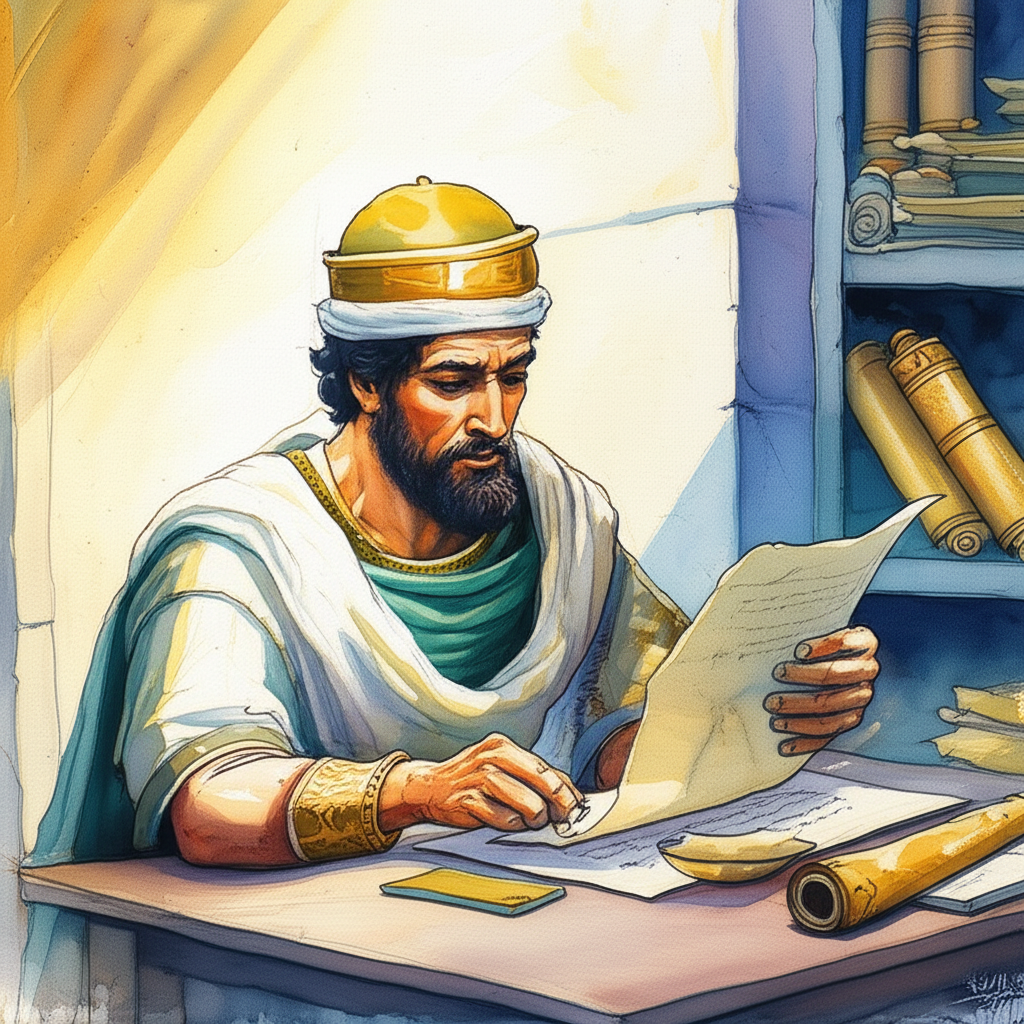
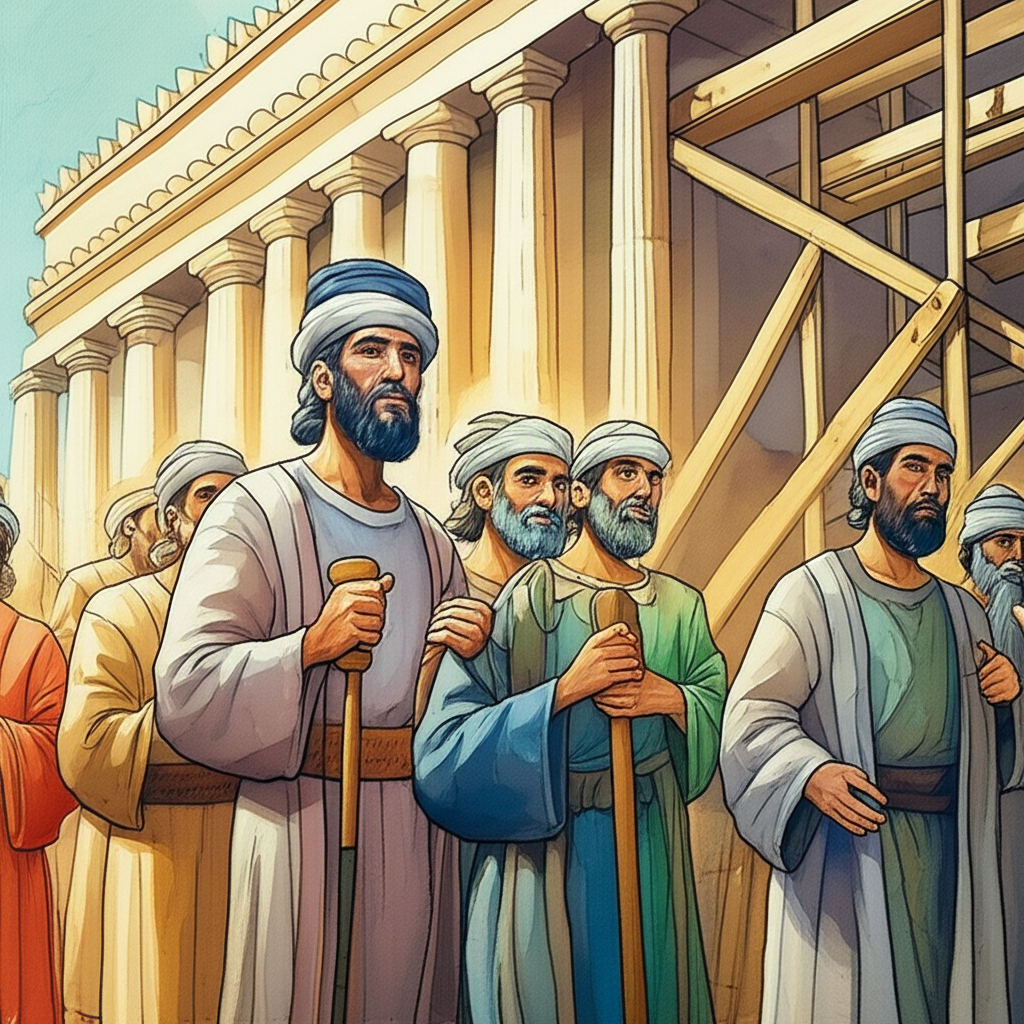
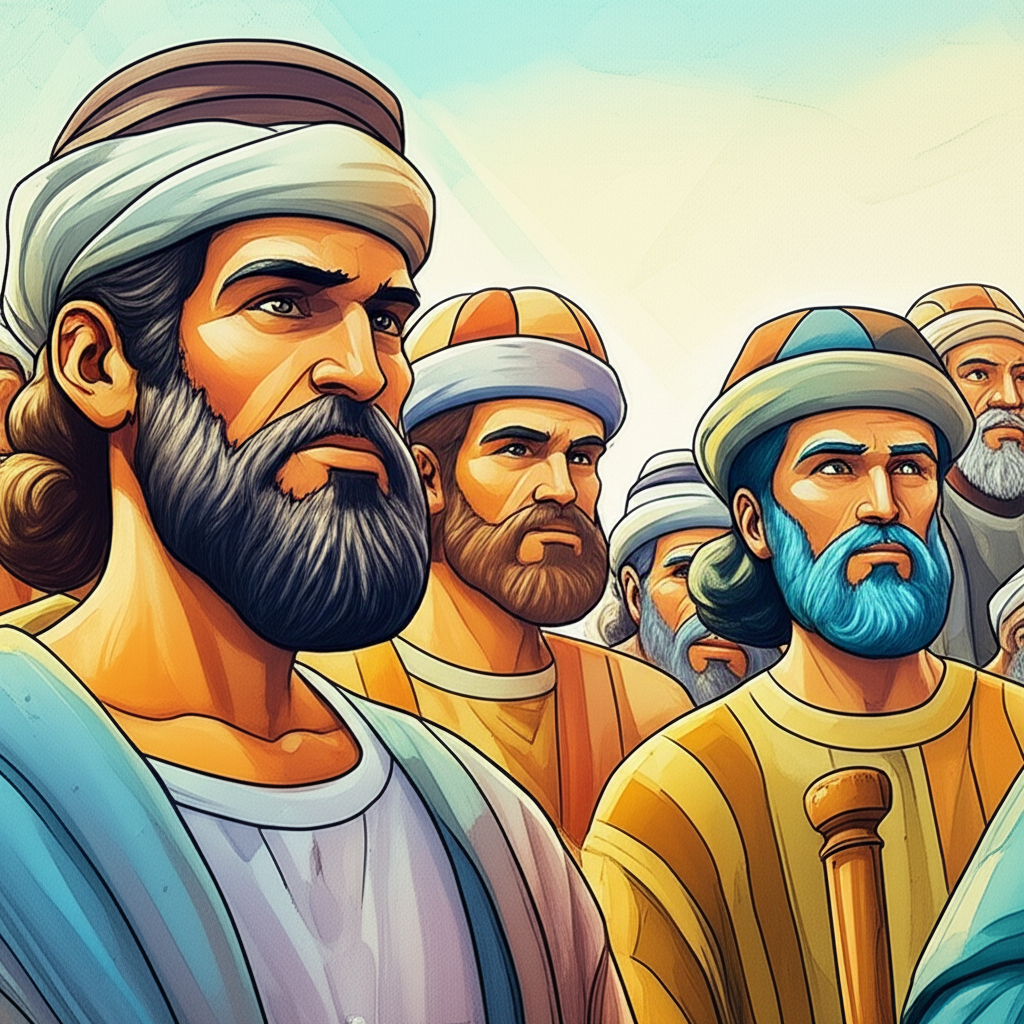
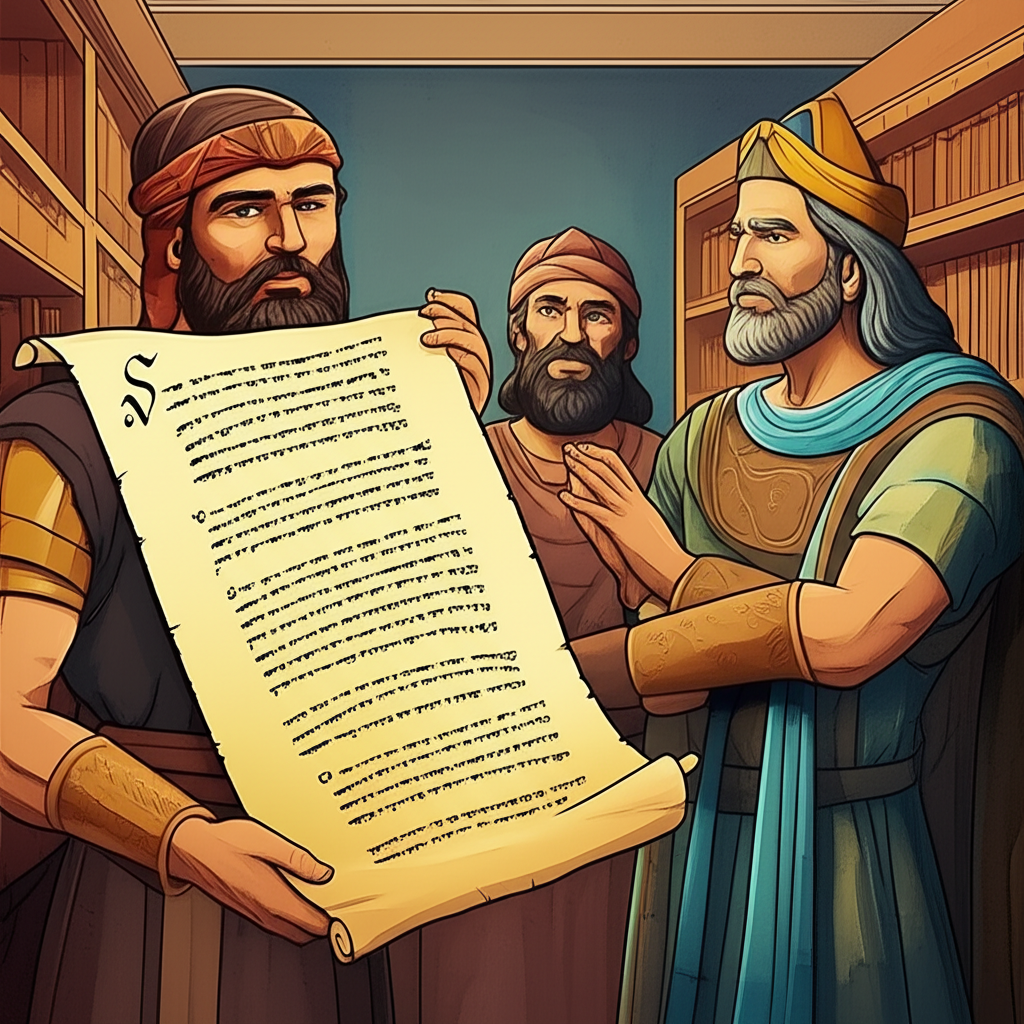
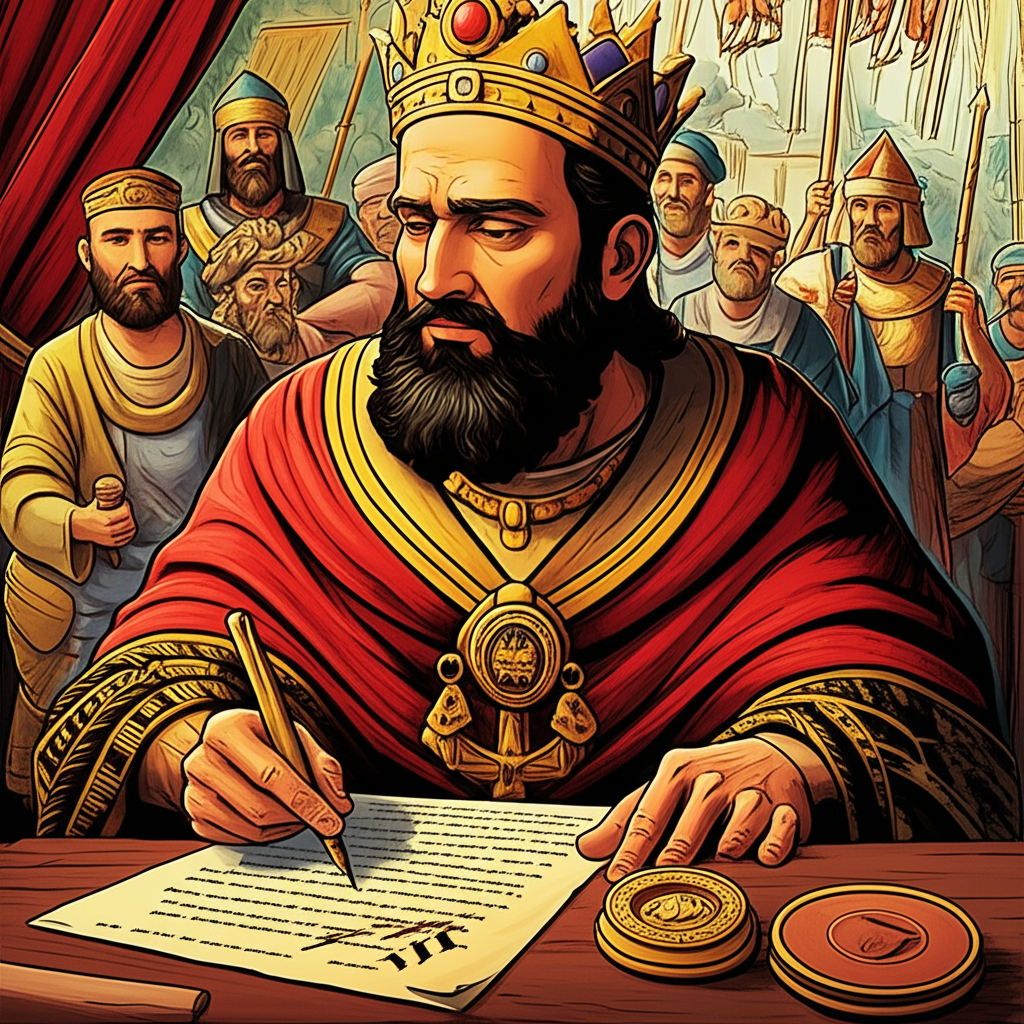
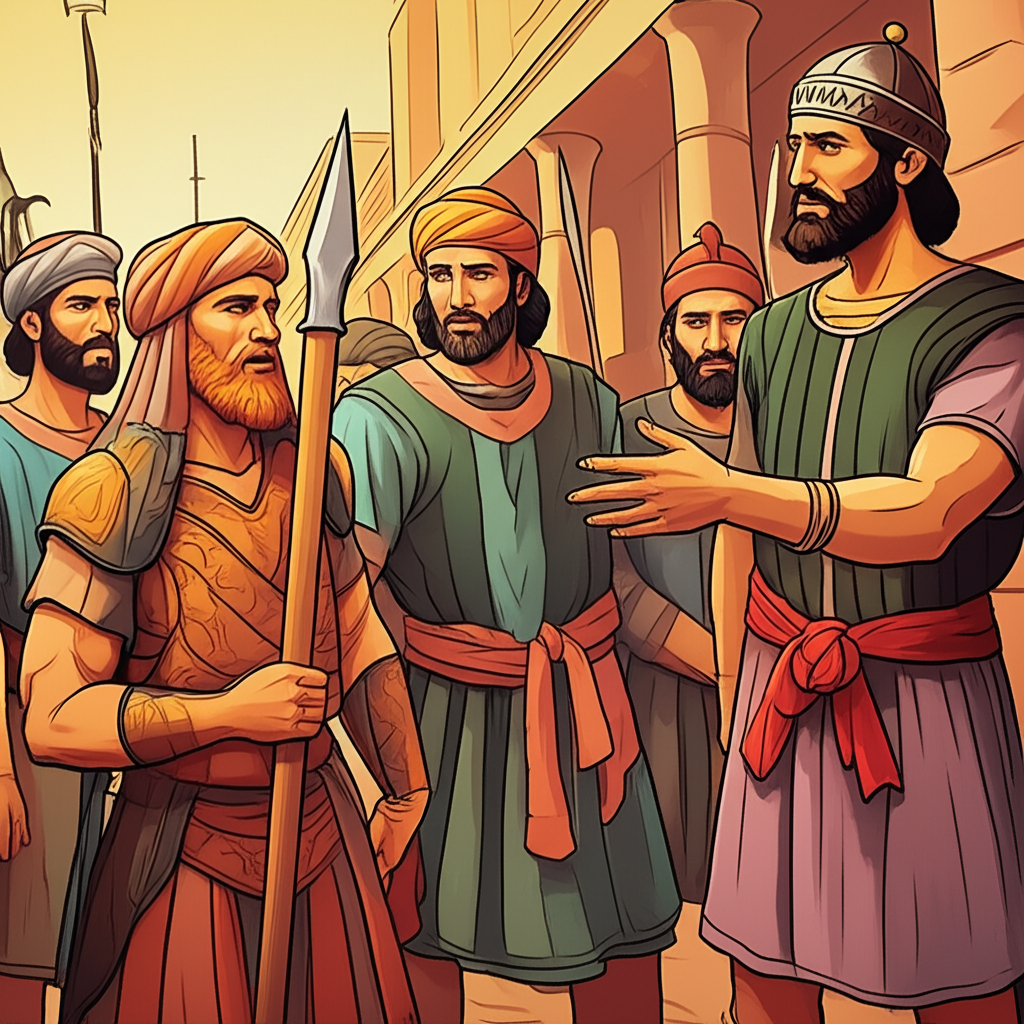
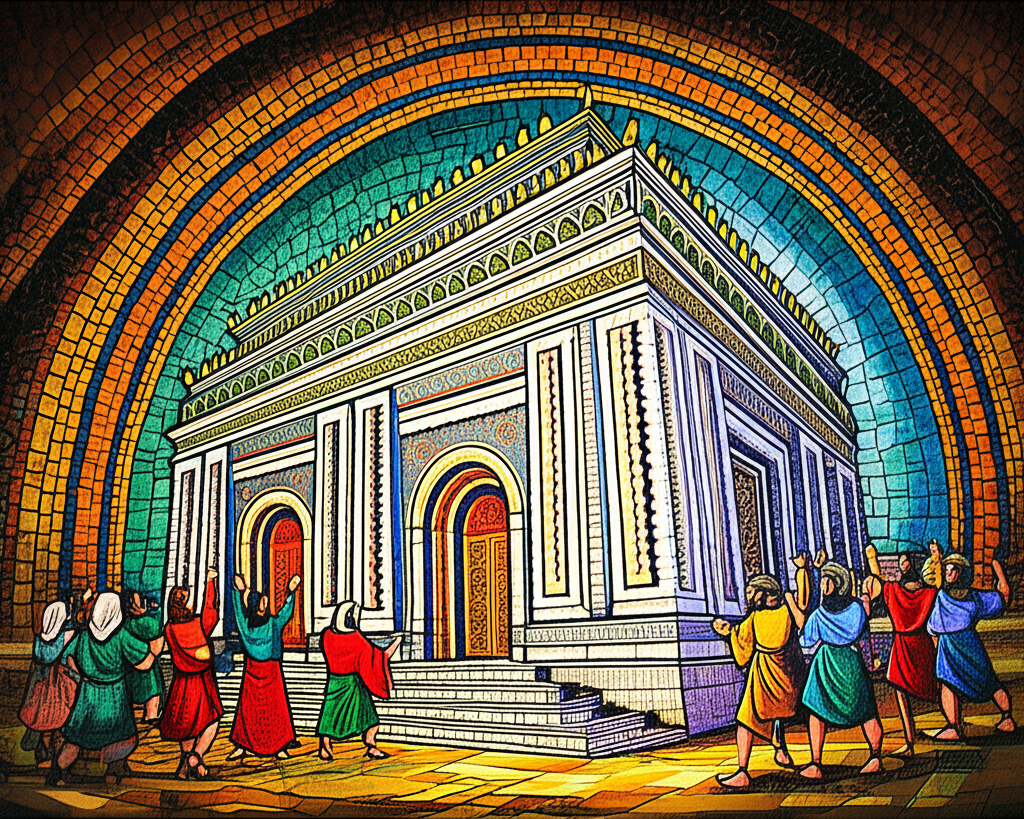
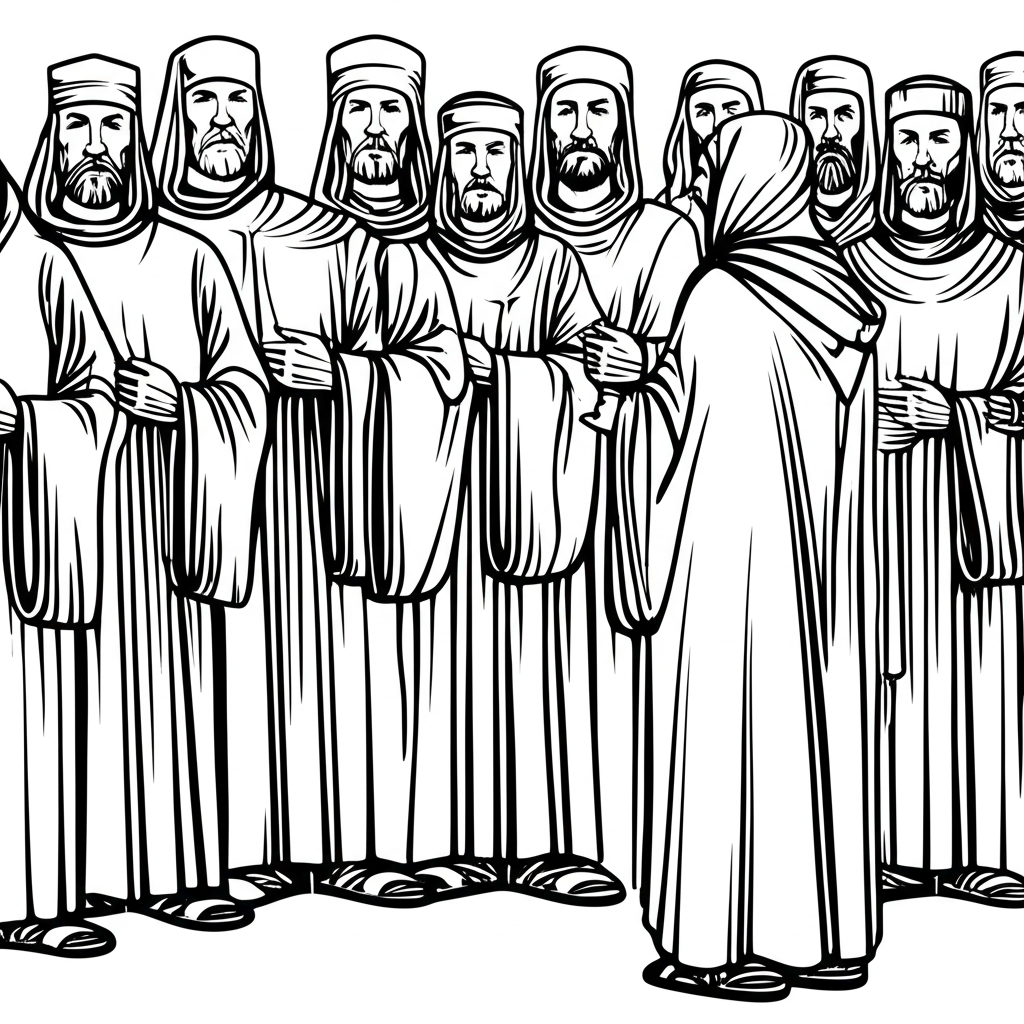
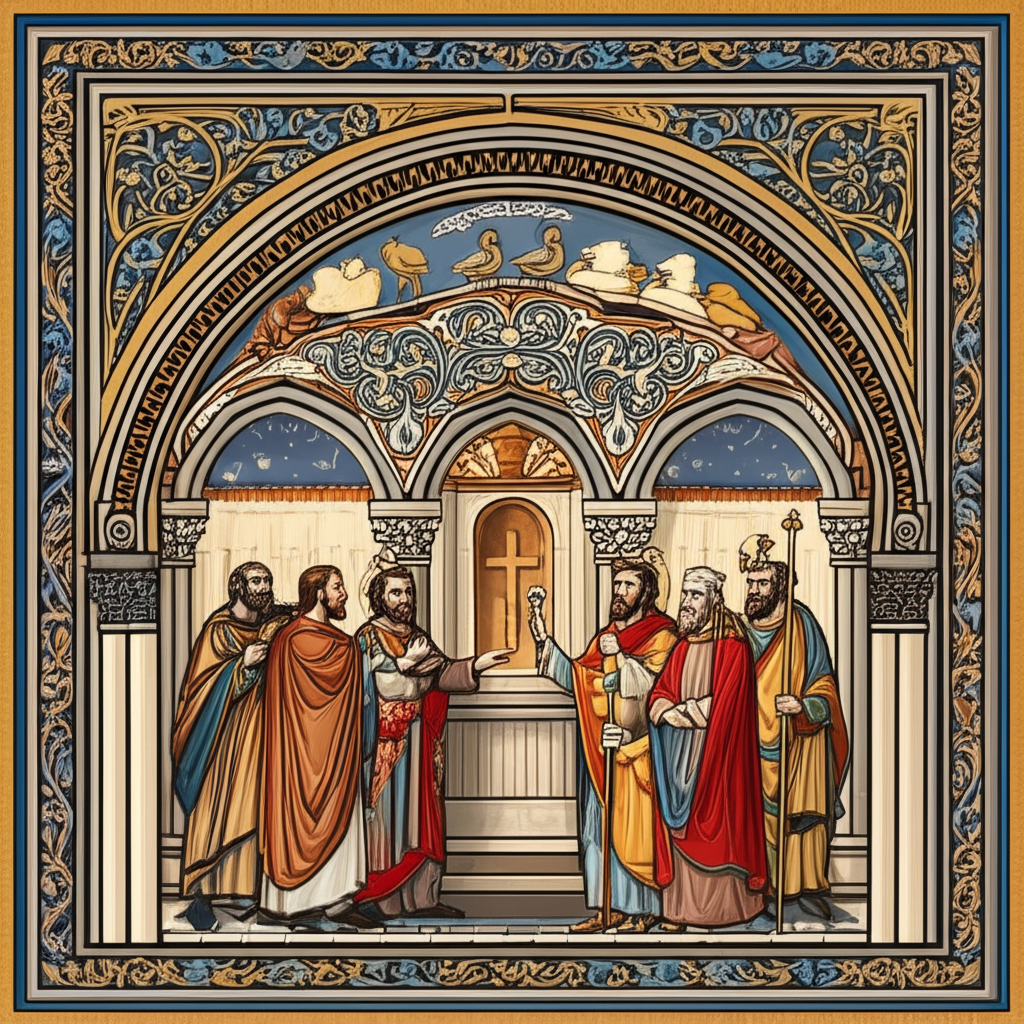
Ezra chapter 6 kjv
- 1 Then Darius the king made a decree, and search was made in the house of the rolls, where the treasures were laid up in Babylon.
- 2 And there was found at Achmetha, in the palace that is in the province of the Medes, a roll, and therein was a record thus written:
- 3 In the first year of Cyrus the king the same Cyrus the king made a decree concerning the house of God at Jerusalem, Let the house be builded, the place where they offered sacrifices, and let the foundations thereof be strongly laid; the height thereof threescore cubits, and the breadth thereof threescore cubits;
- 4 With three rows of great stones, and a row of new timber: and let the expenses be given out of the king's house:
- 5 And also let the golden and silver vessels of the house of God, which Nebuchadnezzar took forth out of the temple which is at Jerusalem, and brought unto Babylon, be restored, and brought again unto the temple which is at Jerusalem, every one to his place, and place them in the house of God.
- 6 Now therefore, Tatnai, governor beyond the river, Shetharboznai, and your companions the Apharsachites, which are beyond the river, be ye far from thence:
- 7 Let the work of this house of God alone; let the governor of the Jews and the elders of the Jews build this house of God in his place.
- 8 Moreover I make a decree what ye shall do to the elders of these Jews for the building of this house of God: that of the king's goods, even of the tribute beyond the river, forthwith expenses be given unto these men, that they be not hindered.
- 9 And that which they have need of, both young bullocks, and rams, and lambs, for the burnt offerings of the God of heaven, wheat, salt, wine, and oil, according to the appointment of the priests which are at Jerusalem, let it be given them day by day without fail:
- 10 That they may offer sacrifices of sweet savours unto the God of heaven, and pray for the life of the king, and of his sons.
- 11 Also I have made a decree, that whosoever shall alter this word, let timber be pulled down from his house, and being set up, let him be hanged thereon; and let his house be made a dunghill for this.
- 12 And the God that hath caused his name to dwell there destroy all kings and people, that shall put to their hand to alter and to destroy this house of God which is at Jerusalem. I Darius have made a decree; let it be done with speed.
- 13 Then Tatnai, governor on this side the river, Shetharboznai, and their companions, according to that which Darius the king had sent, so they did speedily.
- 14 And the elders of the Jews builded, and they prospered through the prophesying of Haggai the prophet and Zechariah the son of Iddo. And they builded, and finished it, according to the commandment of the God of Israel, and according to the commandment of Cyrus, and Darius, and Artaxerxes king of Persia.
- 15 And this house was finished on the third day of the month Adar, which was in the sixth year of the reign of Darius the king.
- 16 And the children of Israel, the priests, and the Levites, and the rest of the children of the captivity, kept the dedication of this house of God with joy.
- 17 And offered at the dedication of this house of God an hundred bullocks, two hundred rams, four hundred lambs; and for a sin offering for all Israel, twelve he goats, according to the number of the tribes of Israel.
- 18 And they set the priests in their divisions, and the Levites in their courses, for the service of God, which is at Jerusalem; as it is written in the book of Moses.
- 19 And the children of the captivity kept the passover upon the fourteenth day of the first month.
- 20 For the priests and the Levites were purified together, all of them were pure, and killed the passover for all the children of the captivity, and for their brethren the priests, and for themselves.
- 21 And the children of Israel, which were come again out of captivity, and all such as had separated themselves unto them from the filthiness of the heathen of the land, to seek the LORD God of Israel, did eat,
- 22 And kept the feast of unleavened bread seven days with joy: for the LORD had made them joyful, and turned the heart of the king of Assyria unto them, to strengthen their hands in the work of the house of God, the God of Israel.
Ezra chapter 6 nkjv
- 1 Then King Darius issued a decree, and a search was made in the archives, where the treasures were stored in Babylon.
- 2 And at Achmetha, in the palace that is in the province of Media, a scroll was found, and in it a record was written thus:
- 3 In the first year of King Cyrus, King Cyrus issued a decree concerning the house of God at Jerusalem: "Let the house be rebuilt, the place where they offered sacrifices; and let the foundations of it be firmly laid, its height sixty cubits and its width sixty cubits,
- 4 with three rows of heavy stones and one row of new timber. Let the expenses be paid from the king's treasury.
- 5 Also let the gold and silver articles of the house of God, which Nebuchadnezzar took from the temple which is in Jerusalem and brought to Babylon, be restored and taken back to the temple which is in Jerusalem, each to its place; and deposit them in the house of God"?
- 6 Now therefore, Tattenai, governor of the region beyond the River, and Shethar-Boznai, and your companions the Persians who are beyond the River, keep yourselves far from there.
- 7 Let the work of this house of God alone; let the governor of the Jews and the elders of the Jews build this house of God on its site.
- 8 Moreover I issue a decree as to what you shall do for the elders of these Jews, for the building of this house of God: Let the cost be paid at the king's expense from taxes on the region beyond the River; this is to be given immediately to these men, so that they are not hindered.
- 9 And whatever they need?young bulls, rams, and lambs for the burnt offerings of the God of heaven, wheat, salt, wine, and oil, according to the request of the priests who are in Jerusalem?let it be given them day by day without fail,
- 10 that they may offer sacrifices of sweet aroma to the God of heaven, and pray for the life of the king and his sons.
- 11 Also I issue a decree that whoever alters this edict, let a timber be pulled from his house and erected, and let him be hanged on it; and let his house be made a refuse heap because of this.
- 12 And may the God who causes His name to dwell there destroy any king or people who put their hand to alter it, or to destroy this house of God which is in Jerusalem. I Darius issue a decree; let it be done diligently.
- 13 Then Tattenai, governor of the region beyond the River, Shethar-Boznai, and their companions diligently did according to what King Darius had sent.
- 14 So the elders of the Jews built, and they prospered through the prophesying of Haggai the prophet and Zechariah the son of Iddo. And they built and finished it, according to the commandment of the God of Israel, and according to the command of Cyrus, Darius, and Artaxerxes king of Persia.
- 15 Now the temple was finished on the third day of the month of Adar, which was in the sixth year of the reign of King Darius.
- 16 Then the children of Israel, the priests and the Levites and the rest of the descendants of the captivity, celebrated the dedication of this house of God with joy.
- 17 And they offered sacrifices at the dedication of this house of God, one hundred bulls, two hundred rams, four hundred lambs, and as a sin offering for all Israel twelve male goats, according to the number of the tribes of Israel.
- 18 They assigned the priests to their divisions and the Levites to their divisions, over the service of God in Jerusalem, as it is written in the Book of Moses.
- 19 And the descendants of the captivity kept the Passover on the fourteenth day of the first month.
- 20 For the priests and the Levites had purified themselves; all of them were ritually clean. And they slaughtered the Passover lambs for all the descendants of the captivity, for their brethren the priests, and for themselves.
- 21 Then the children of Israel who had returned from the captivity ate together with all who had separated themselves from the filth of the nations of the land in order to seek the LORD God of Israel.
- 22 And they kept the Feast of Unleavened Bread seven days with joy; for the LORD made them joyful, and turned the heart of the king of Assyria toward them, to strengthen their hands in the work of the house of God, the God of Israel.
Ezra chapter 6 niv
- 1 King Darius then issued an order, and they searched in the archives stored in the treasury at Babylon.
- 2 A scroll was found in the citadel of Ecbatana in the province of Media, and this was written on it: Memorandum:
- 3 In the first year of King Cyrus, the king issued a decree concerning the temple of God in Jerusalem: Let the temple be rebuilt as a place to present sacrifices, and let its foundations be laid. It is to be sixty cubits high and sixty cubits wide,
- 4 with three courses of large stones and one of timbers. The costs are to be paid by the royal treasury.
- 5 Also, the gold and silver articles of the house of God, which Nebuchadnezzar took from the temple in Jerusalem and brought to Babylon, are to be returned to their places in the temple in Jerusalem; they are to be deposited in the house of God.
- 6 Now then, Tattenai, governor of Trans-Euphrates, and Shethar-Bozenai and you other officials of that province, stay away from there.
- 7 Do not interfere with the work on this temple of God. Let the governor of the Jews and the Jewish elders rebuild this house of God on its site.
- 8 Moreover, I hereby decree what you are to do for these elders of the Jews in the construction of this house of God: Their expenses are to be fully paid out of the royal treasury, from the revenues of Trans-Euphrates, so that the work will not stop.
- 9 Whatever is needed?young bulls, rams, male lambs for burnt offerings to the God of heaven, and wheat, salt, wine and olive oil, as requested by the priests in Jerusalem?must be given them daily without fail,
- 10 so that they may offer sacrifices pleasing to the God of heaven and pray for the well-being of the king and his sons.
- 11 Furthermore, I decree that if anyone defies this edict, a beam is to be pulled from their house and they are to be impaled on it. And for this crime their house is to be made a pile of rubble.
- 12 May God, who has caused his Name to dwell there, overthrow any king or people who lifts a hand to change this decree or to destroy this temple in Jerusalem. I Darius have decreed it. Let it be carried out with diligence.
- 13 Then, because of the decree King Darius had sent, Tattenai, governor of Trans-Euphrates, and Shethar-Bozenai and their associates carried it out with diligence.
- 14 So the elders of the Jews continued to build and prosper under the preaching of Haggai the prophet and Zechariah, a descendant of Iddo. They finished building the temple according to the command of the God of Israel and the decrees of Cyrus, Darius and Artaxerxes, kings of Persia.
- 15 The temple was completed on the third day of the month Adar, in the sixth year of the reign of King Darius.
- 16 Then the people of Israel?the priests, the Levites and the rest of the exiles?celebrated the dedication of the house of God with joy.
- 17 For the dedication of this house of God they offered a hundred bulls, two hundred rams, four hundred male lambs and, as a sin offering for all Israel, twelve male goats, one for each of the tribes of Israel.
- 18 And they installed the priests in their divisions and the Levites in their groups for the service of God at Jerusalem, according to what is written in the Book of Moses.
- 19 On the fourteenth day of the first month, the exiles celebrated the Passover.
- 20 The priests and Levites had purified themselves and were all ceremonially clean. The Levites slaughtered the Passover lamb for all the exiles, for their relatives the priests and for themselves.
- 21 So the Israelites who had returned from the exile ate it, together with all who had separated themselves from the unclean practices of their Gentile neighbors in order to seek the LORD, the God of Israel.
- 22 For seven days they celebrated with joy the Festival of Unleavened Bread, because the LORD had filled them with joy by changing the attitude of the king of Assyria so that he assisted them in the work on the house of God, the God of Israel.
Ezra chapter 6 esv
- 1 Then Darius the king made a decree, and search was made in Babylonia, in the house of the archives where the documents were stored.
- 2 And in Ecbatana, the citadel that is in the province of Media, a scroll was found on which this was written: "A record.
- 3 In the first year of Cyrus the king, Cyrus the king issued a decree: Concerning the house of God at Jerusalem, let the house be rebuilt, the place where sacrifices were offered, and let its foundations be retained. Its height shall be sixty cubits and its breadth sixty cubits,
- 4 with three layers of great stones and one layer of timber. Let the cost be paid from the royal treasury.
- 5 And also let the gold and silver vessels of the house of God, which Nebuchadnezzar took out of the temple that is in Jerusalem and brought to Babylon, be restored and brought back to the temple that is in Jerusalem, each to its place. You shall put them in the house of God."
- 6 "Now therefore, Tattenai, governor of the province Beyond the River, Shethar-bozenai, and your associates the governors who are in the province Beyond the River, keep away.
- 7 Let the work on this house of God alone. Let the governor of the Jews and the elders of the Jews rebuild this house of God on its site.
- 8 Moreover, I make a decree regarding what you shall do for these elders of the Jews for the rebuilding of this house of God. The cost is to be paid to these men in full and without delay from the royal revenue, the tribute of the province from Beyond the River.
- 9 And whatever is needed ? bulls, rams, or sheep for burnt offerings to the God of heaven, wheat, salt, wine, or oil, as the priests at Jerusalem require ? let that be given to them day by day without fail,
- 10 that they may offer pleasing sacrifices to the God of heaven and pray for the life of the king and his sons.
- 11 Also I make a decree that if anyone alters this edict, a beam shall be pulled out of his house, and he shall be impaled on it, and his house shall be made a dunghill.
- 12 May the God who has caused his name to dwell there overthrow any king or people who shall put out a hand to alter this, or to destroy this house of God that is in Jerusalem. I Darius make a decree; let it be done with all diligence."
- 13 Then, according to the word sent by Darius the king, Tattenai, the governor of the province Beyond the River, Shethar-bozenai, and their associates did with all diligence what Darius the king had ordered.
- 14 And the elders of the Jews built and prospered through the prophesying of Haggai the prophet and Zechariah the son of Iddo. They finished their building by decree of the God of Israel and by decree of Cyrus and Darius and Artaxerxes king of Persia;
- 15 and this house was finished on the third day of the month of Adar, in the sixth year of the reign of Darius the king.
- 16 And the people of Israel, the priests and the Levites, and the rest of the returned exiles, celebrated the dedication of this house of God with joy.
- 17 They offered at the dedication of this house of God 100 bulls, 200 rams, 400 lambs, and as a sin offering for all Israel 12 male goats, according to the number of the tribes of Israel.
- 18 And they set the priests in their divisions and the Levites in their divisions, for the service of God at Jerusalem, as it is written in the Book of Moses.
- 19 On the fourteenth day of the first month, the returned exiles kept the Passover.
- 20 For the priests and the Levites had purified themselves together; all of them were clean. So they slaughtered the Passover lamb for all the returned exiles, for their fellow priests, and for themselves.
- 21 It was eaten by the people of Israel who had returned from exile, and also by every one who had joined them and separated himself from the uncleanness of the peoples of the land to worship the LORD, the God of Israel.
- 22 And they kept the Feast of Unleavened Bread seven days with joy, for the LORD had made them joyful and had turned the heart of the king of Assyria to them, so that he aided them in the work of the house of God, the God of Israel.
Ezra chapter 6 nlt
- 1 So King Darius issued orders that a search be made in the Babylonian archives, which were stored in the treasury.
- 2 But it was at the fortress at Ecbatana in the province of Media that a scroll was found. This is what it said: "Memorandum:
- 3 "In the first year of King Cyrus's reign, a decree was sent out concerning the Temple of God at Jerusalem. "Let the Temple be rebuilt on the site where Jews used to offer their sacrifices, using the original foundations. Its height will be ninety feet, and its width will be ninety feet.
- 4 Every three layers of specially prepared stones will be topped by a layer of timber. All expenses will be paid by the royal treasury.
- 5 Furthermore, the gold and silver cups, which were taken to Babylon by Nebuchadnezzar from the Temple of God in Jerusalem, must be returned to Jerusalem and put back where they belong. Let them be taken back to the Temple of God."
- 6 So King Darius sent this message: "Now therefore, Tattenai, governor of the province west of the Euphrates River, and Shethar-bozenai, and your colleagues and other officials west of the Euphrates River ? stay away from there!
- 7 Do not disturb the construction of the Temple of God. Let it be rebuilt on its original site, and do not hinder the governor of Judah and the elders of the Jews in their work.
- 8 "Moreover, I hereby decree that you are to help these elders of the Jews as they rebuild this Temple of God. You must pay the full construction costs, without delay, from my taxes collected in the province west of the Euphrates River so that the work will not be interrupted.
- 9 "Give the priests in Jerusalem whatever is needed in the way of young bulls, rams, and male lambs for the burnt offerings presented to the God of heaven. And without fail, provide them with as much wheat, salt, wine, and olive oil as they need each day.
- 10 Then they will be able to offer acceptable sacrifices to the God of heaven and pray for the welfare of the king and his sons.
- 11 "Those who violate this decree in any way will have a beam pulled from their house. Then they will be lifted up and impaled on it, and their house will be reduced to a pile of rubble.
- 12 May the God who has chosen the city of Jerusalem as the place to honor his name destroy any king or nation that violates this command and destroys this Temple. "I, Darius, have issued this decree. Let it be obeyed with all diligence."
- 13 Tattenai, governor of the province west of the Euphrates River, and Shethar-bozenai and their colleagues complied at once with the command of King Darius.
- 14 So the Jewish elders continued their work, and they were greatly encouraged by the preaching of the prophets Haggai and Zechariah son of Iddo. The Temple was finally finished, as had been commanded by the God of Israel and decreed by Cyrus, Darius, and Artaxerxes, the kings of Persia.
- 15 The Temple was completed on March 12, during the sixth year of King Darius's reign.
- 16 The Temple of God was then dedicated with great joy by the people of Israel, the priests, the Levites, and the rest of the people who had returned from exile.
- 17 During the dedication ceremony for the Temple of God, 100 young bulls, 200 rams, and 400 male lambs were sacrificed. And 12 male goats were presented as a sin offering for the twelve tribes of Israel.
- 18 Then the priests and Levites were divided into their various divisions to serve at the Temple of God in Jerusalem, as prescribed in the Book of Moses.
- 19 On April 21 the returned exiles celebrated Passover.
- 20 The priests and Levites had purified themselves and were ceremonially clean. So they slaughtered the Passover lamb for all the returned exiles, for their fellow priests, and for themselves.
- 21 The Passover meal was eaten by the people of Israel who had returned from exile and by the others in the land who had turned from their corrupt practices to worship the LORD, the God of Israel.
- 22 Then they celebrated the Festival of Unleavened Bread for seven days. There was great joy throughout the land because the LORD had caused the king of Assyria to be favorable to them, so that he helped them to rebuild the Temple of God, the God of Israel.
- Bible Book of Ezra
- 1 The Proclamation of Cyrus
- 2 The Exiles Return
- 3 Rebuilding the Altar
- 4 Adversaries Oppose the Rebuilding
- 5 Rebuilding Begins Anew
- 6 The Decree of Darius
- 7 Ezra Sent to Teach the People
- 8 Genealogy of Those Who Returned with Ezra
- 9 Ezra Prays About Intermarriage
- 10 The People Confess Their Sin